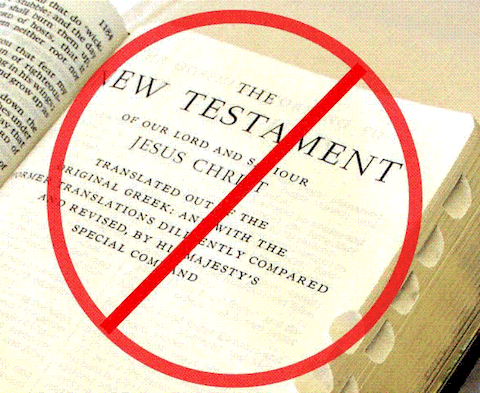
1001 Errors in the Christian Bible
Home
Dedication
Matthew
Mark
Luke
John
Acts
Contact Us
Luke -- Errors 390-396
#390
Luke 14: (KJV)
33 “So likewise, whosoever he be of you that forsaketh not all
that he hath, he cannot be my disciple.”
More bad/contradictory advice.
# 391
Luke 16: (KJV)
14 “And the Pharisees also, who were covetous, heard all these
things: and they derided him.”
KJV’s “covetous” above is a mistranslation which should
be “money lovers” which most modern translations use. Neither
Jewish writings, Pagan writings or early Christian writings other than
“Luke” describe the Pharisees as money lovers and this is likely
why the KJV mistranslated. The Sadducees were the wealthy Jews so the
author of “Luke” either confused them with the Pharisees or
wasn’t overly concerned with accurately portraying history. One lesson
we can learn from the Christian Bible is that it usually is a bad idea
to categorize an entire group of people as possessing a negative quality
(stereotyping). It’s especially ironic considering the subsequent
Catholic Church’s obsession with accumulating wealth (ever visited
the Vatican?).
# 392
Luke 16: (KJV)
16 “The law and the prophets were until John: since that time
the kingdom of God is preached, and every man presseth into it.”
Contradicted by the Tanakh many times as the eternal quality of the Law
may be the most common assertion in the Tanakh.
# 393
Luke 16: (KJV)
16 “The law and the prophets were until John: since that time
the kingdom of God is preached, and every man presseth into it. 17 And
it is easier for heaven and earth to pass, than one tittle of the law
to fail.”
Apparently “Luke” felt that “Matthew” type explanations
of how Jesus didn’t change the Law by changing the Law were unclear
so he provides his own explanation above.
# 394
Luke 16: (KJV)
17 “And it is easier for heaven and earth to pass, than one tittle
of the law to fail.
18 Whosoever putteth away his wife, and marrieth another, committeth adultery:
and whosoever marrieth her that is put away from her husband committeth
adultery.”
Regarding acceptable causes for divorce the Law of Deuteronomy states
the following:
24:1 (JPS) “When a man taketh a wife, and marrieth her, then it
cometh to pass, if she find no favour in his eyes, because he hath found
some unseemly thing in her, that he writeth her a bill of divorcement,
and giveth it in her hand, and sendeth her out of his house, and she departeth
out of his house, and goeth and becometh another man's wife, and the latter
husband hateth her, and writeth her a bill of divorcement, and giveth
it in her hand, and sendeth her out of his house; or if the latter husband
die, who took her to be his wife; her former husband, who sent her away,
may not take her again to be his wife, after that she is defiled;”
So Jesus stated that he would not change the Law but he did change the
Law regarding acceptable causes for divorce.
# 395
Luke 16: (KJV)
18 “Whosoever putteth away his wife, and marrieth another, committeth
adultery: and whosoever marrieth her that is put away from her husband
committeth adultery.”
Compare to Mark 10: (KJV)
11 And he saith unto them, Whosoever shall put away his wife, and marry
another, committeth adultery against her.
12 And if a woman shall put away her husband, and be married to another,
she committeth adultery.
Note that in “Mark’s” explanation the man and woman are
guilty of adultery while in “Luke’s” explanation only the
man is guilty of adultery. This is one of many pieces of evidence that
“Luke” was written by a woman.
# 396
Luke 18: (KJV)
20 “Thou knowest the commandments, Do not commit adultery, Do
not kill, Do not steal, Do not bear false witness, Honour thy father and
thy mother.”
Compare to Mark 10: (KJV)
19 “Thou knowest the commandments, Do not commit adultery, Do
not kill, Do not steal, Do not bear false witness, Defraud not, Honour
thy father and mother.”
The two versions look like they start out the same but the underlying
Greek of Mark 10:19 has “do not kill” before “do not commit
adultery”. A majority of modern Christian translations correctly
translate based on the order of the underlying Greek. In fairness to the
KJV I’m not aware of any commandment which says “Do not change
the word order to avoid the appearance of error”. Having “Do
not commit adultery” first is even more evidence that “Luke”
was written by a woman. Imagine, a story all about The Son Of Man written
by The Daughter Of Man. As the fella once said, “Ain’t that
a kick in the head”.